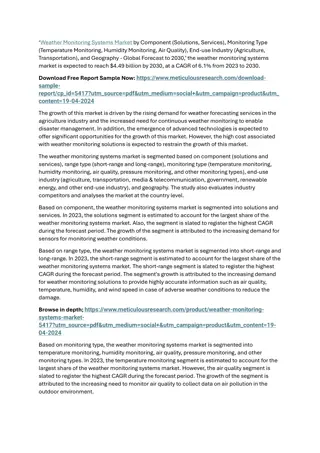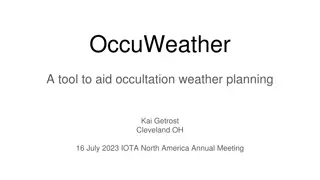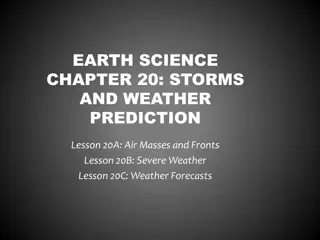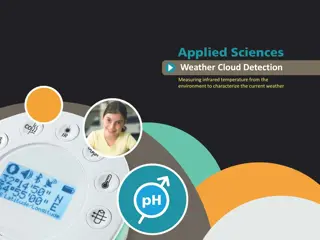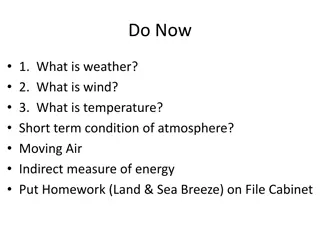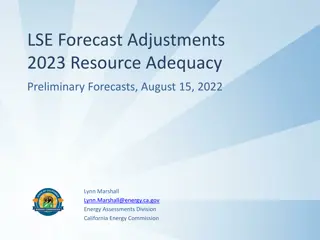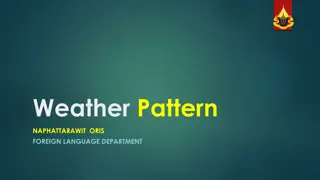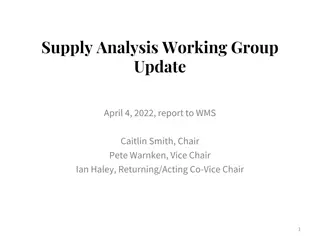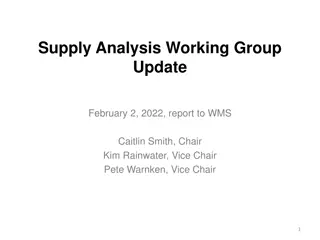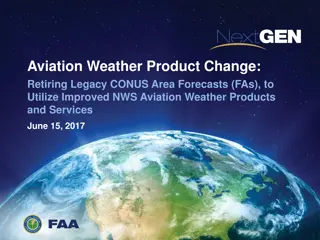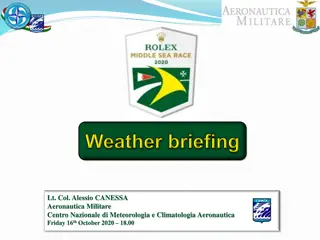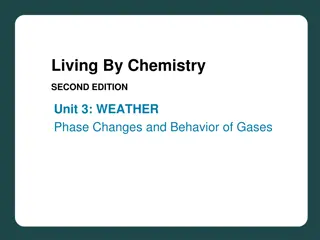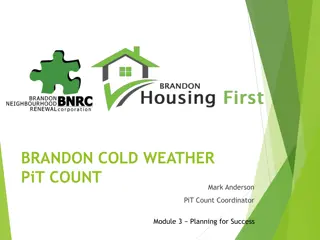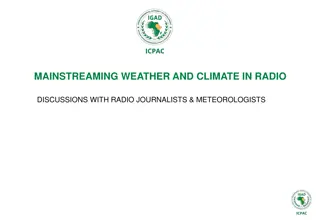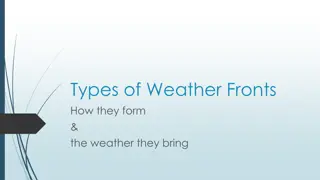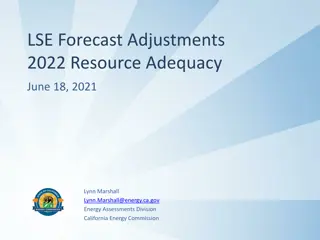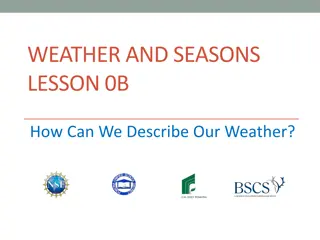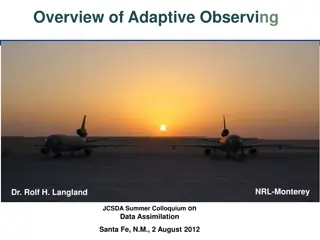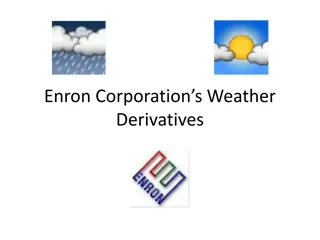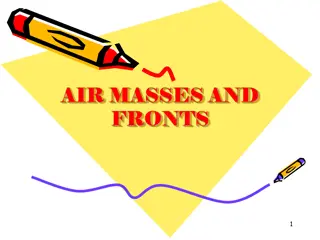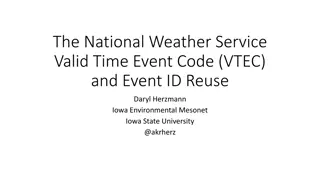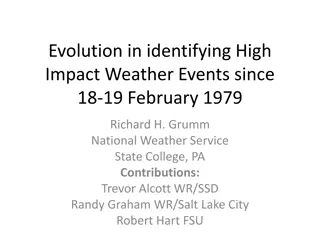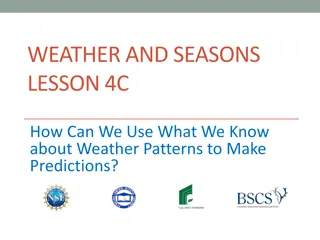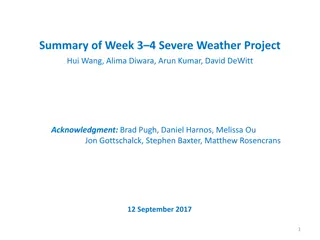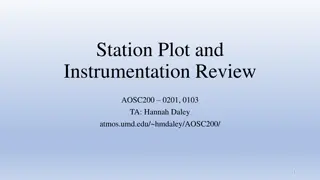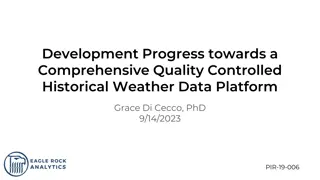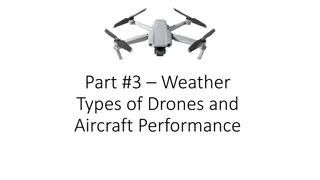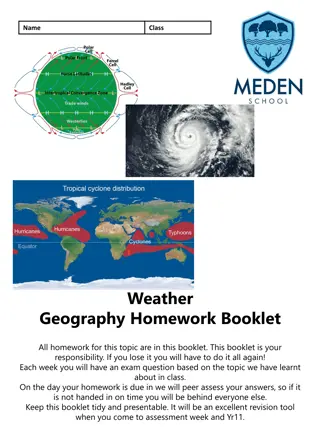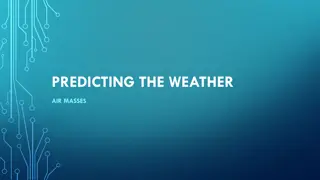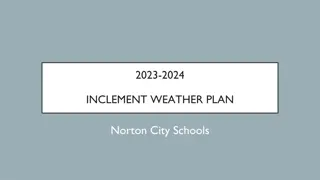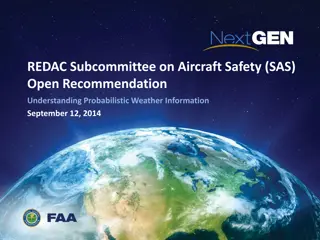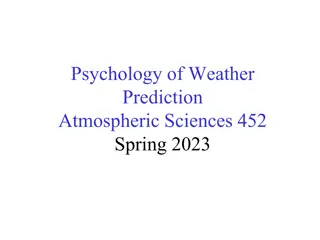Weather Map Interpretation
Weather maps provide data on various weather elements at a specific time. They show isobars, wind direction, cloud cover, rainfall, and more. Weather maps differ from synoptic charts which provide additional detailed information. Analyzing weather maps helps predict weather trends.
6 views • 7 slides
Weather Monitoring Systems Market 2
The increased need for continuous weather monitoring to enable disaster management and the rapid weather fluctuations and climate changes drive the growth of this market. In addition, the increasing adoption of sensors for weather monitoring and the emergence of advanced technologies are expected to
8 views • 2 slides
OccuWeather: A Tool for Occultation Weather Planning
OccuWeather is a valuable tool designed to assist in occultation weather planning, aiding participants like Kai Getrost at the IOTA North America Annual Meeting in Cleveland, OH on 16 July 2023. It provides full-browser scale imagery, displays event paths on live weather forecasts, and offers a cons
0 views • 26 slides
Understanding Air Masses, Fronts, and Severe Weather in Earth Science
In Chapter 20 of Earth Science, we delve into the dynamics of air masses, fronts, and severe weather. Meteorologists study the movement and characteristics of air masses to predict weather changes. Air masses, defined by their temperature and humidity, interact at fronts, leading to precipitation an
0 views • 7 slides
Exploring Weather through Infrared Temperature Detection
Studying everyday weather using infrared temperature detection from the environment can help in understanding the relationship between temperature variations of different objects and weather conditions. This activity involves creating hypotheses and testing them using an infrared temperature sensor.
0 views • 20 slides
Understanding Weather: Key Concepts and Factors Explained
Weather is the combination of various elements such as temperature, wind, humidity, and more. Wind is the movement of air, temperature is the measure of energy, and relative humidity indicates the amount of moisture in the air compared to its capacity. Dew point is the temperature at which air becom
0 views • 21 slides
Resource Adequacy Load Forecast Adjustments 2023
The document outlines the process of adjusting load forecasts for resource adequacy in 2023, focusing on factors such as IOU service areas, coincidence factors, peak demand estimates, LSE-specific adjustments, demand-side programs, and pro-rata adjustments. It includes detailed data and forecasts fo
1 views • 15 slides
Global Economic Prospects January 2022 - Insights and Forecasts
In the Global Economic Prospects January 2022 report by the World Bank, insights and forecasts about the global economic scenario, growth forecasts, risks like inflation and income inequality, interconnected risks, and lessons from past debt restructurings are discussed. The report highlights the su
7 views • 16 slides
Interactive Learning Activities for Weather Pattern Exploration
Engage students in fun activities like listening and drawing games, exploring weather proverbs, and practicing grammar with weather-related examples. Learn about weather patterns and how to inquire about the weather in English while enhancing language skills.
0 views • 12 slides
Supply Analysis Working Group Update Report
The latest update from the Supply Analysis Working Group presented on April 4, 2022, includes insights on mid-term load forecasting, project success factor analysis, and development cycle trends. The group emphasizes the importance of updating forecast models seasonally and adjusting to weather patt
0 views • 13 slides
ERCOT Supply Analysis Working Group February 2022 Update Report
The Supply Analysis Working Group (SAWG) updated the ERCOT committee in February 2022 on various aspects including long-term load forecast discussions, reductions in load forecasts due to COVID impacts, rooftop PV forecasts, and the December 2021 CDR review highlighting a drop in summer 2022 reserve
0 views • 8 slides
Weather Alert System and Carline Procedures
Thor Guard Lightning is a lighting alert system that provides visual and auditory signals for different weather conditions. Severe weather such as storms or lightning can trigger alerts, leading to specific actions like taking cover or seeking safety indoors. During inclement weather, students and t
0 views • 4 slides
Transition of Legacy CONUS Area Forecasts in Aviation Weather Modernization
On June 15, 2017, the National Weather Service announced a transition plan to retire legacy CONUS Area Forecasts (FAs) and adopt improved aviation weather products and services. The transition period will last three months, with full implementation expected by October 10, 2017. The goal is to enhanc
5 views • 9 slides
Weather Forecast and Safety Implications for 41st Rolex Middle Sea Race Malta 2020
Lt. Col. Alessio Canessa from Aeronautica Militare provides insights on the predictability of weather, wind forecasts, and safety impacts for the start of the 41st Rolex Middle Sea Race Malta 2020. Uncertainty of predictions and the 7-day weather forecast for sailing conditions are discussed, highli
0 views • 41 slides
Exploring Weather Phenomena and Meteorological Predictions
Dive into the fascinating world of weather phenomena and the science behind meteorological predictions in this unit of Living By Chemistry SECOND EDITION. Learn about proportional relationships, temperature scales, behavior of gases, and how to interpret weather maps to make accurate predictions. En
0 views • 19 slides
Weather and Climate Information Dissemination in Rwanda During Covid-19
The Covid-19 pandemic impacted the traditional dissemination of weather and climate information in Rwanda, leading to the adoption of virtual methods for awareness campaigns and forecasts. Various government bodies collaborated to ensure the public was informed and prepared for extreme weather event
0 views • 7 slides
Cold Weather Pit Count Coordinator Module 3 Planning for Success
Cold weather presents challenges for conducting pit counts to address homelessness. Visibility of homelessness decreases in cold weather, making locating individuals more challenging. Planning ahead with contingency dates, volunteer coordination, and route planning is crucial for success in cold wea
0 views • 11 slides
Mainstreaming Weather and Climate in Radio Discussions
Weather and climate significantly influence various aspects of our lives, from our daily activities to business operations and food supply. This content discusses the importance of incorporating weather and climate discussions in radio broadcasts, emphasizing their impact on health, agriculture, bus
1 views • 19 slides
Understanding Weather Fronts: How They Form and Impact Weather Patterns
Weather fronts, including cold fronts, warm fronts, stationary fronts, and occluded fronts, play a crucial role in influencing weather patterns. Cold fronts bring quick storms with heavy rain and thunder, while warm fronts lead to gentle rain followed by milder weather. Stationary fronts result in p
0 views • 17 slides
Resource Adequacy Forecast Adjustments for 2022
The document provides detailed insights into the process of adjusting load forecasts for resource adequacy in 2022, including steps such as developing reference forecasts, applying adjustments, and evaluating peak demand estimates. It also compares the resource adequacy forecast for 2022 with that o
0 views • 14 slides
Understanding Weather: Describing and Observing Weather Patterns
Exploring the fundamentals of weather observation and description, this lesson highlights the importance of using our senses to assess weather conditions such as temperature, wind, and precipitation. Students are encouraged to actively engage with their environment to describe the weather accurately
0 views • 10 slides
Adaptive Observing Techniques for Weather Forecasting
This presentation by Dr. Rolf H. Langland explores the concept of adaptive observing in atmospheric applications, focusing on the methodology, field programs, challenges, and objectives of targeted observing. It delves into the optimization problem of determining locations for special atmospheric ob
0 views • 47 slides
Weather Derivatives and Risk Management in Utilities
Explore the impact of weather on businesses, specifically utilities, and how weather insurance products can help mitigate risks. Learn about Pacific Northwest Electric's challenges in the face of changing weather patterns and the use of weather protection products. Discover the utility lingo, possib
0 views • 9 slides
Understanding Magnetospheric Models and Space Weather Prediction
Explore the complexities of modeling the interplanetary magnetic field and solar wind velocity to predict space weather using various magnetospheric models. Learn how the CCMC facilitates research and visualizations, and understand the challenges of discrepancies in model predictions impacting the a
0 views • 14 slides
Understanding Air Masses and Fronts in Weather Systems
Air masses play a crucial role in weather patterns, characterized by temperature and moisture content. They form over specific regions and influence weather conditions when they interact at fronts. Fronts are boundaries between air masses, such as cold fronts, warm fronts, occluded fronts, and stati
0 views • 17 slides
Understanding the National Weather Service Valid Time Event Code (VTEC)
Explore the evolution of the National Weather Service Valid Time Event Code (VTEC) system introduced in 2005 by Daryl Herzmann at Iowa State University. Learn about the importance of VTEC in weather alerts and how it revolutionized the dissemination of critical weather information. Dive into example
0 views • 10 slides
Evolution in Identifying High-Impact Weather Events since February 1979
Evolution in identifying high-impact weather events since 18-19 February 1979 discusses the advancements in identifying significant weather events. The article highlights the influence of standardized anomalies in recognizing features associated with extreme weather, aiding in the accurate identific
0 views • 22 slides
Understanding Weather Patterns for Predictions
Explore how weather patterns in different locations influence predictions as you review weather data for Detroit and Pomona in January. Learn to make claims about where and when a story takes place using evidence from weather calendars and graphs. Enhance your understanding of weather observation an
0 views • 17 slides
Challenges in Aligning Job Forecasts with Housing Needs and Population Growth
The housing needs assessment discusses the challenges of aligning job forecasts with housing demands and population growth. It cautions against blindly translating job forecasts into housing needs without considering demographic projections and commuting ratios. Real-life examples highlight the impo
0 views • 7 slides
Severe Weather Project Summary for Week 34
Week 34 of the Severe Weather Project focused on expanding development and evaluation of severe weather potential model guidance. The project aimed to develop experimental forecast tools for severe weather at Week 3-4 time range, utilizing a hybrid model and SCP (Supercell Composite Parameter). The
0 views • 21 slides
Understanding Weather Station Data and Atmospheric Pressure Basics
Explore essential concepts in meteorology including weather station instrumentation, atmospheric pressure determination, weather map basics, and isotherm plotting. Learn about interpreting weather station models, identifying pressure systems, and understanding isotherms for temperature analysis on w
0 views • 5 slides
Progress Towards a Quality-Controlled Historical Weather Data Platform
Comprehensive development progress towards a quality-controlled historical weather data platform led by Dr. Grace Di Cecco, focusing on the challenges of accessing and aggregating weather observations from various sources and the project's goals of cleaning, aggregating, and standardizing hourly wea
0 views • 21 slides
Understanding Weather Impact on Drones and Aircraft Performance
Delve into the influence of weather conditions on drones and aircraft operations. Explore different types of drones, sensors, and aircraft performance in various weather scenarios. Discover how wind, visibility, and FAA tests affect flight safety. Learn about sources of weather information like META
1 views • 23 slides
Geography Homework Booklet - Weather and Climate Study
A comprehensive geography homework booklet focused on understanding weather and climate topics, covering concepts such as the key differences between weather and climate, forecasting weather conditions, reasons for tropical storms losing energy, and the UK's experience with extreme weather events. S
0 views • 6 slides
Understanding Air Masses in Weather Prediction
Air masses play a crucial role in weather patterns. They are large bodies of air with consistent temperature and humidity characteristics. Different types of air masses, such as Continental Polar and Maritime Tropical, influence weather conditions based on their properties. Weather fronts form where
0 views • 9 slides
Norton City Schools Inclement Weather Plan 2023-2024
The Norton City Schools' Inclement Weather Plan for 2023-2024 outlines procedures for decision-making during severe weather conditions, including the use of altered schedules, remote learning days, and early dismissals. The plan includes detailed steps for monitoring road conditions, checking weathe
0 views • 18 slides
Understanding Probabilistic Weather Information in Aircraft Safety Recommendations
Subcommittee on Aircraft Safety (SAS) emphasizes the importance of understanding probabilistic weather information for better operational decisions in aviation. Recommendations include leveraging existing knowledge and conducting studies to improve user understanding and decision-making processes re
0 views • 12 slides
Understanding the Psychology of Weather Prediction in Atmospheric Sciences
Delve into the intricate psychology behind weather prediction in Atmospheric Sciences 452 during Spring 2023. Discover how meteorologists' biases and psychological tendencies impact forecast accuracy, leading to overcompensation, love for extreme weather events, and attachment to conceptual models.
0 views • 18 slides
School Weather Alert System Procedures
A detailed overview of the school's weather alert system including Thor Guard lightning alerts and procedures for inclement weather conditions. It covers the different states of detection, horn signals, and actions to be taken during severe weather. The protocol for handling inclement weather, excep
0 views • 4 slides
Weather Forecast Details for Madagascar
Satellite images, synoptic charts, analysis, wind patterns, and precipitation forecasts for Madagascar show a generally calm weather scenario with light winds and few showers expected over the northern part in the upcoming days. The western coast may experience warmer temperatures. No extreme weathe
0 views • 12 slides

